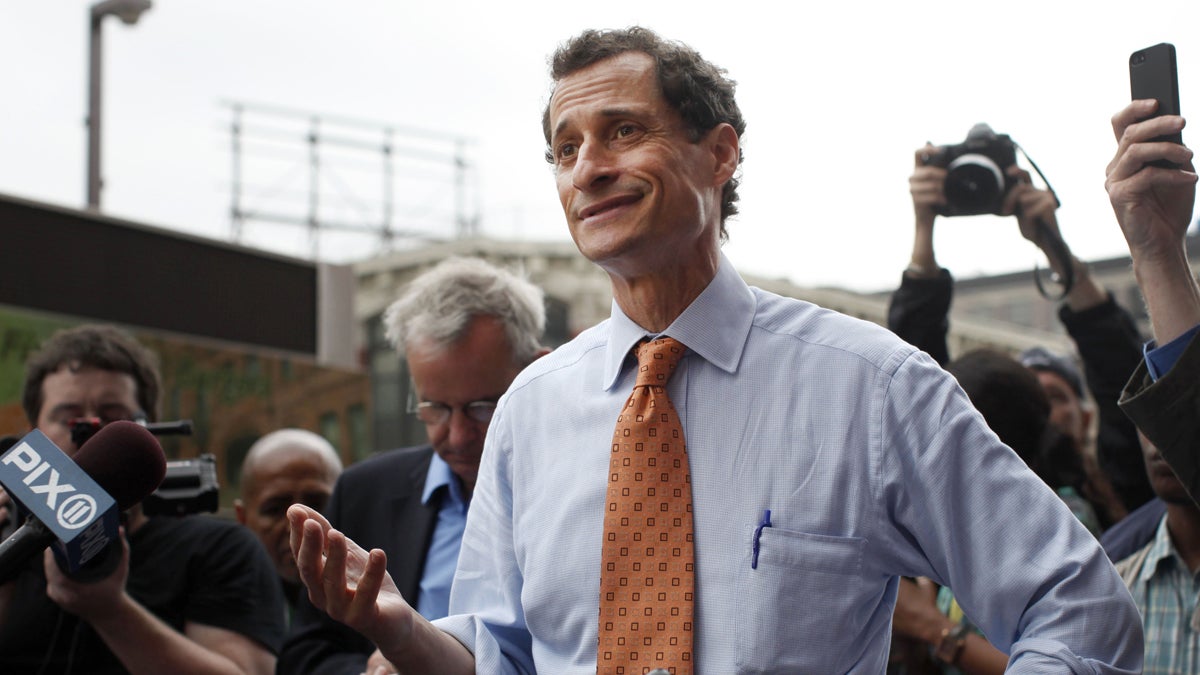In defense of sex scandals

New York City mayoral hopeful Anthony Weiner speaks to reporters during a campaign event in May. (AP Photo/Jason DeCrow, file)
Forgive me, Lord, for I have sinned: I cheated on my wife. I brought shame and dishonor to her, and to my children. But I have asked them to forgive me.
And now I’m asking voters to forgive me, too.
Welcome to our political culture of sexual confession.
Forgive me, Lord, for I have sinned: I cheated on my wife. I brought shame and dishonor to her and to my children, but I have asked them to forgive me.
And now I’m asking voters to forgive me, too.
Welcome to our political culture of sexual confession. Pioneered by Bill Clinton, who groveled on TV after his affair with Monica Lewinsky was exposed, confession has become an invaluable weapon for leaders who are caught with their proverbial pants down.
Witness the fates of Clinton’s fellow Southerners David Vitter and Mark Sanford. Vitter won re-election to his Louisiana Senate seat in 2010 after admitting a “serious sin” involving prostitutes. Earlier this year, former South Carolina Gov. Sanford captured a House seat after acknowledging an extramarital affair.
In New York, meanwhile, Anthony Weiner and Eliot Spitzer are trying to pull off the same stunt. Forced to resign from Congress when his racy tweets to women came to light, Weiner is the frontrunning candidate for mayor in some polls. And Spitzer recently announced his bid to become city controller, despite a prostitution scandal that pushed him out of the the governor’s office.
It’s easy to poke fun at the tawdry, soap-opera quality of these modern media dramas. But there’s also something quintessentially democratic about them. By exposing our leaders’ all-too-human mistakes and inconsistencies, we push them off their pedestals. And we remind ourselves that we are their bosses, not the other way around.
That was also the point of sex scandals in the nineteenth century, when newspapers published rumors that might make today’s readers blush. Whereas Europeans regarded public officials as a “superior force,” French political thinker Alexis de Tocqueville observed, Americans saw these officials as their servants. So journalists saw it as their right — and their duty — to follow politicians “into private life, and disclose all their weaknesses and vices,” he wrote in his now-classic 1840 book, Democracy in America.
Most notoriously, reporters exposed Thomas Jefferson for fathering children by one of his slaves, Sally Hemings. They also detailed the tangled extramarital affairs of Alexander Hamilton, Jefferson’s chief ideological opponent, who paid blackmail money to his mistress’ husband.
Not all of the scandalous claims were accurate, of course. When newspapers falsely reported that John Quincy Adams had procured an American virgin for the lust of the Russian czar, Adams grumbled privately about “the thousand malicious lies which outvenom all the worms of the Nile.”
So did William Henry Harrison, whom reporters accused of fathering several illegitimate children. “I am the most persecuted and calumniated person now living,” Harrison complained, during his 1840 bid for the White House. He won anyway.
Indeed, politicians could survive even confirmed accounts of sexual impropriety. Consider the successful 1884 presidential campaign of Grover Cleveland, who had fathered a child out of wedlock and was paying for the baby’s care. “Ma, Ma, Where’s My Pa?” Cleveland’s GOP opponents chanted. When Cleveland won, his supporters had a snappy retort: “He’s gone to the White House, Ha, Ha, Ha.”
After that — and until very recent times — political sex scandals mostly disappeared from the nation’s front pages. Newspapers didn’t discuss the well-known extramarital affairs of Warren Harding or Franklin Roosevelt, whose longtime mistress was at Roosevelt’s bedside when he died. Nor did the papers report on the extraordinary sexual shenanigans at John F. Kennedy’s White House, where naked pool parties were already the stuff of legend.
Indeed, journalists thought their job was to protect Presidents from personal attack. So when Harding’s former mistress published a book about their affair, newspapers called on government officials to censor it. Indeed, one journalist wrote, publicizing “such terrible statements about a dead ex-President” was a breach of “patriotic integrity.”
But the many government lies of Vietnam and Watergate brought this era of deference to a close. They also brought back the earlier tradition of sex charges, with a new twist: Candidates were now expected to reply, and — most of all — to confess.
In part, the trend reflected the infusion of evangelical Protestantism into modern politics. Emphasizing personal conversion and redemption, evangelicals also appear more willing to forgive a politician’s sexual transgressions.
It’s too early to tell whether Weiner and Spitzer — who are both Jewish — will get a similar pardon from New York voters. But here’s what we do know: They’ll both be called to account for their mistakes, because they’re not a whit better than the flawed human beings who elect them.
More than a century ago, Grover Cleveland boasted privately to a friend that he had avoided discussing his own sex scandal in public. Keeping quiet about such matters was “not only necessary but the only possible way,” Cleveland wrote.
Today, it wouldn’t be necessary or possible. And lucky for us. Democracies elect people, not gods. It’s always good to bring them down to earth.
WHYY is your source for fact-based, in-depth journalism and information. As a nonprofit organization, we rely on financial support from readers like you. Please give today.

